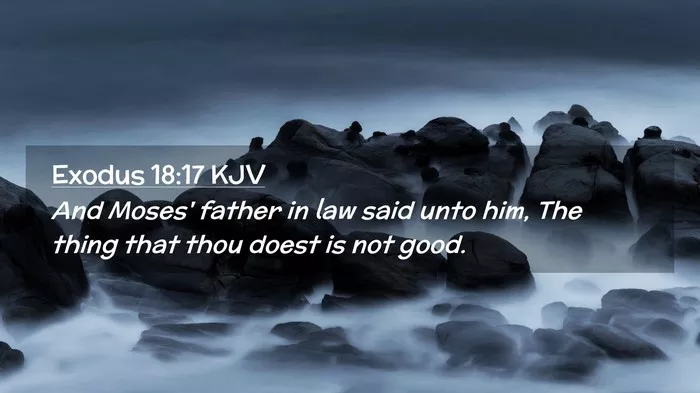Read the Daily Bible Verse – Exodus 18:17 To Strengthen Your Spiritual Journey.
Exodus 18:17 (KJV): “And Moses’ father in law said unto him, The thing that thou doest is not good.”
This verse, spoken by Jethro, Moses’ father-in-law, occurs within a critical narrative in the Book of Exodus. To understand its depth and relevance, we must delve into its context, meaning, and application while comparing it to other Biblical texts and exploring its modern-day significance.
The Context on Exodus 18:17 KJV
The verse is part of the larger story in Exodus 18, where Jethro observes Moses leading the Israelites after their escape from Egypt. Moses acts as the sole judge for all disputes among the people, a responsibility that consumes his time and energy. Seeing Moses overwhelmed by the burden of leadership, Jethro advises him to delegate tasks and share the workload.
Jethro’s statement, “The thing that thou doest is not good,” critiques Moses’ approach to leadership. This is not a condemnation of Moses’ dedication but rather a recognition of the inefficiency and unsustainability of his method. Jethro’s advice introduces the concept of shared responsibility, a pivotal moment that reshapes how Moses leads the Israelites.
The Exodus 18:17 Meaning
At its core, Exodus 18:17 highlights the importance of wisdom in leadership. Jethro’s critique is rooted in care and concern, pointing out that Moses’ method is neither good for him nor the people he serves. By attempting to handle every issue alone, Moses risks burnout and inefficiency, both detrimental to his leadership and the well-being of the community.
This verse also underscores the Biblical principle of counsel. Jethro acts as a wise advisor, demonstrating that even leaders need guidance and must remain open to constructive criticism. It reflects the broader Biblical theme that leadership is not about individual strength but about collective wisdom and support.
Exodus 18:17 Application in Life
The practical applications of this verse extend far beyond the context of ancient Israel. Its lessons resonate in personal, professional, and spiritual domains:
Avoiding Burnout: Like Moses, individuals in leadership or high-responsibility roles must recognize their limitations. Overloading oneself with tasks can lead to physical, mental, and emotional exhaustion.
The Importance of Delegation: Effective leaders understand the value of delegating tasks. By empowering others to share the workload, they foster teamwork, increase efficiency, and build community.
Seeking Wise Counsel: Jethro’s role as an advisor reminds us of the importance of seeking guidance from experienced and trusted individuals. Wise counsel can help identify blind spots and offer fresh perspectives.
Humility in Leadership: Moses’ willingness to listen to Jethro reflects humility, a quality essential for effective leadership. Leaders must remain teachable and open to feedback.
Comparison with Other Biblical Texts
Exodus 18:17 aligns with other scriptures that emphasize wisdom, delegation, and counsel:
Proverbs 11:14 (KJV): “Where no counsel is, the people fall: but in the multitude of counsellors there is safety.” This verse echoes the value of seeking advice and sharing responsibilities for the betterment of the community.
Ecclesiastes 4:9-10 (KJV): “Two are better than one; because they have a good reward for their labour. For if they fall, the one will lift up his fellow.” The idea of collaboration and mutual support complements Jethro’s advice to Moses.
Acts 6:1-4: In the New Testament, the apostles appoint deacons to manage the daily distribution of food so they can focus on prayer and ministry. This delegation mirrors Jethro’s advice, showing that the principle of shared responsibility remains consistent throughout Scripture.
Modern-Day Relevance
In today’s world, Exodus 18:17 offers profound insights for various aspects of life:
In the Workplace: Managers and leaders can learn from Jethro’s advice by delegating tasks and empowering team members. This not only improves efficiency but also builds trust and morale within the team.
In Family Life: Parents often bear significant responsibilities. Sharing tasks among family members teaches cooperation and eases burdens, fostering a sense of community within the household.
In Ministry: Church leaders can apply this principle by involving others in ministry tasks. Delegating roles allows for broader participation and ensures that no single individual is overburdened.
In Personal Growth: Recognizing the need for support and seeking guidance from mentors or advisors is essential for personal and spiritual growth.
Conclusion
Exodus 18:17 is a timeless verse that encapsulates profound truths about leadership, collaboration, and humility. Jethro’s critique of Moses offers a practical lesson: no one can or should bear the weight of responsibility alone. The principles of delegation, wise counsel, and shared responsibility are as relevant today as they were in Moses’ time.
Whether in leadership, family, or ministry, Exodus 18:17 challenges us to embrace humility, seek wisdom, and work collaboratively to achieve greater effectiveness and harmony. Through this verse, we see a glimpse of God’s wisdom, teaching us that true strength lies not in solitary effort but in shared responsibility and community.
Exodus 18:17 Commentary
The commentary on Exodus 18:17 often highlights Jethro’s wisdom and Moses’ humility. Renowned theologians and Biblical scholars interpret this verse as a pivotal teaching moment that illustrates God’s design for collaborative leadership.
Matthew Henry’s Commentary notes that Jethro’s advice was practical and divinely inspired, ensuring Moses could lead effectively without becoming overwhelmed. It praises the balance between Moses’ dedication and his willingness to accept help.
Albert Barnes’ Notes on the Bible emphasize Jethro’s keen observation and practical wisdom. Barnes views Jethro’s advice as a precursor to the organized judicial system later seen in Israel.
These insights highlight that Jethro’s critique was not a rebuke but a constructive suggestion born out of love and concern for Moses and the community.
Related Topics:
- Exodus 18:16 Meaning, Context & Commentary
- What Does Exodus 18:15 Mean?
- Exodus 18:14 Meaning, Context & Commentary

